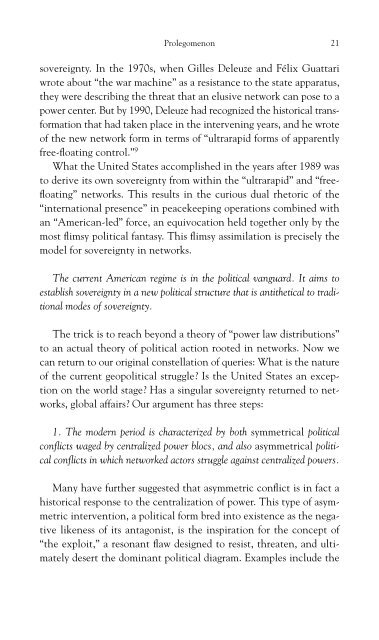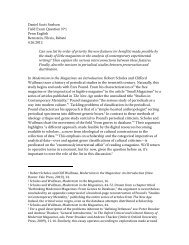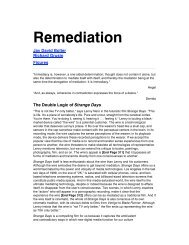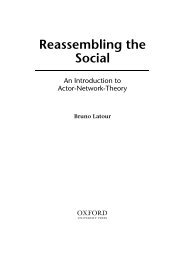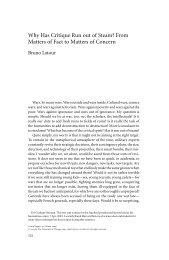The Exploit: A Theory of Networks - asounder
The Exploit: A Theory of Networks - asounder
The Exploit: A Theory of Networks - asounder
You also want an ePaper? Increase the reach of your titles
YUMPU automatically turns print PDFs into web optimized ePapers that Google loves.
Prolegomenon 21<br />
sovereignty. In the 1970s, when Gilles Deleuze and Félix Guattari<br />
wrote about “the war machine” as a resistance to the state apparatus,<br />
they were describing the threat that an elusive network can pose to a<br />
power center. But by 1990, Deleuze had recognized the historical transformation<br />
that had taken place in the intervening years, and he wrote<br />
<strong>of</strong> the new network form in terms <strong>of</strong> “ultrarapid forms <strong>of</strong> apparently<br />
free - floating control.” 9<br />
What the United States accomplished in the years after 1989 was<br />
to derive its own sovereignty from within the “ultrarapid” and “free -<br />
floating” networks. This results in the curious dual rhetoric <strong>of</strong> the<br />
“international presence” in peacekeeping operations combined with<br />
an “American - led” force, an equivocation held together only by the<br />
most flimsy political fantasy. This flimsy assimilation is precisely the<br />
model for sovereignty in networks.<br />
<strong>The</strong> current American regime is in the political vanguard. It aims to<br />
establish sovereignty in a new political structure that is antithetical to traditional<br />
modes <strong>of</strong> sovereignty.<br />
<strong>The</strong> trick is to reach beyond a theory <strong>of</strong> “power law distributions”<br />
to an actual theory <strong>of</strong> political action rooted in networks. Now we<br />
can return to our original constellation <strong>of</strong> queries: What is the nature<br />
<strong>of</strong> the current geopolitical struggle? Is the United States an exception<br />
on the world stage? Has a singular sovereignty returned to networks,<br />
global affairs? Our argument has three steps:<br />
1. <strong>The</strong> modern period is characterized by both symmetrical political<br />
conflicts waged by centralized power blocs, and also asymmetrical political<br />
conflicts in which networked actors struggle against centralized powers.<br />
Many have further suggested that asymmetric conflict is in fact a<br />
historical response to the centralization <strong>of</strong> power. This type <strong>of</strong> asymmetric<br />
intervention, a political form bred into existence as the negative<br />
likeness <strong>of</strong> its antagonist, is the inspiration for the concept <strong>of</strong><br />
“the exploit,” a resonant flaw designed to resist, threaten, and ultimately<br />
desert the dominant political diagram. Examples include the


